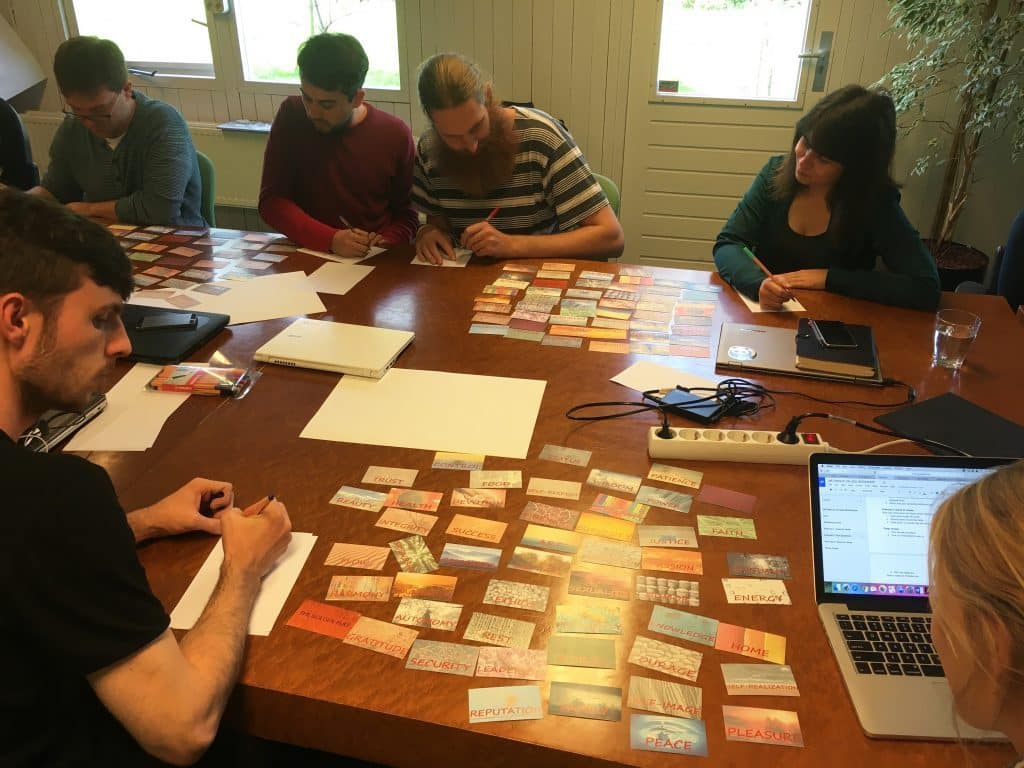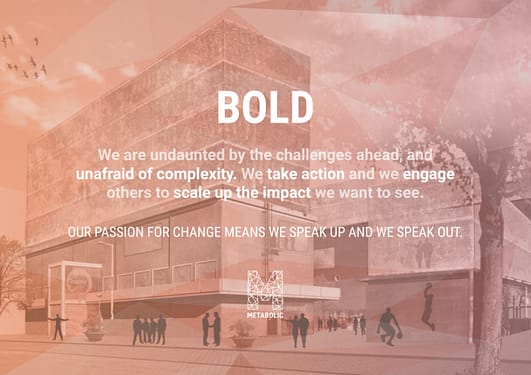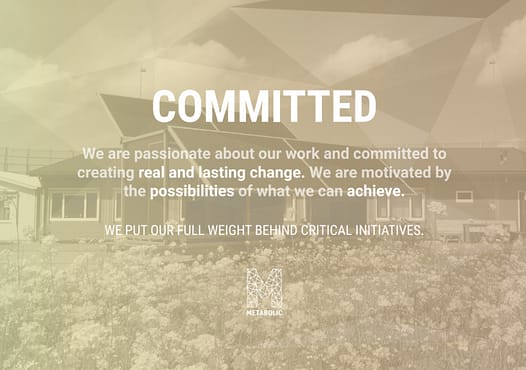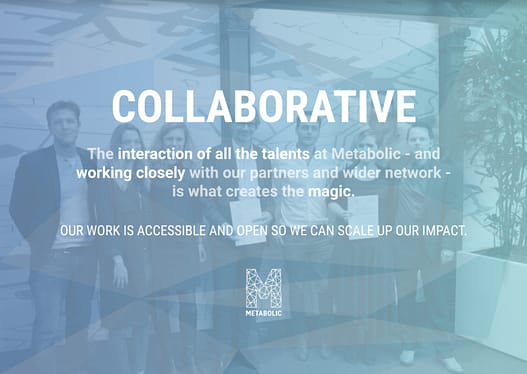On World Values Day, we are looking at how values drive our organizational success and help us further reach our mission. Here Metabolic Communications Director Adam Stones provides the golden rules for how every business can build their own core company values, and bring them to life to accelerate change.
Values are powerful. They are the heart of every organisation as they reflect what is important and capture collective motivations. They are the glue that binds the organization together. They define the way it operates and how the world sees it. They guide it and keep it on track. When we lose touch with them, we lose direction.
Don’t just take my word for it. Research by PwC highlights that companies with distinctive and aligned values are twice as successful with execution, and almost twice more likely to show higher profitability and growth. Furthermore, strong and attractive values have been shown to significantly help to recruit and retain talent.
So here’s my 6 golden rules for how to establish values that work and ensure they make an impact:
Rule 1: Values help us pursue our purpose, so start there
An organization must be clear on why it exists if it is to communicate the sorts of values it holds and how it expects its people to behave. A purpose motivates people in a way that pursuing profits alone never will. Purpose takes you from ‘managing’ to ‘mobilizing’. And organizations that put purpose at their heart demonstrably outperform those that don’t. Without purpose it is difficult to motivate employees and put the company on the course to success. So find your purpose – ensure it is relevant, authentic and relatable. Then tell it’s story. At Metabolic our purpose is to help the global economy to become fundamentally sustainable – we pursue this purpose with a passion that motivates and binds us.
Rule 2: Create values that stretch you
There are a number of ways to identify your core values. A useful place to start for those, literally, starting out is on the World Values Day website, where you can download tools and materials to facilitate workshops.
At Metabolic we surveyed every employee to find out what they thought our values should be, and we looked at personality cards to see what combinations felt represented us now and in the direction we wanted to take. We boiled this all down to five key values that we felt represented the most important aspects of how we saw ourselves, whilst at the same time providing a framework to steer future focus, and to stretch us to live them even more fully.
Metabolic has five key values. These are: Bold, Inspiring, Creative, Collaborative, and Committed. I know – they could be any organization’s. Enron had values. Everyone has values. The key is in how they are embodied specifically by us. Beside each of our values lies a descriptor of precisely what this means to us; a motivational statement of intent. And behind each value sits another descriptor – how we expect our colleagues to live these values in their day to day work. These are live, measurable and visible guides to steer everyone on this shared path.
Rule 3: Understanding the values is not the same as knowing them
Printing your values and only hanging them on the wall is not enough. They need to be brought to life and turned into daily habits and behaviours. This needs effort, encouragement, and ownership throughout the whole organisation.
Earlier this week, in anticipation of World Values Day, we held a workshop to explore this. The session was led by our friend Joze Petrich, Chief Values Officer of Aikipath. He helps guide business strategy and who has created a ‘Game of Values’ to help everyone (from families to CEOs) understand the importance of values and how to live them. (Check out his website for more or to help him bring the game to market). The workshop helped us to define our own personal values (and understand each other better), explore how we personally aligned with the company and identify ways to bridge the two, as well as detail ways to more actively realise the company values through our daily actions.
And in the near future we’re producing a ‘Culture Book’ for all employees, which will further bring the values to life and ensure everyone understands how they can contribute to the company’s success, as well as their own development. This is especially important for new starters who need to quickly understand our collective and ambitious vision, and who might otherwise take their cultural clues from the few people they work immediately with, or impose their own interpretation.

Metabolic team playing the Game of Values, from Aikipath
Rule 4: Values are only effective when we measure them
Values are abstract concepts. Where do they live, beyond organizational value statements? You need to experience them for them to be real. You need to give them form if you want to see what works or measure them. Values instill in us attitudes and behaviours and ultimately they drive outcomes – we can measure these to ensure they are working.
For our workshop, we asked everyone to give examples of how they are living the values, and where the company can demonstrate them. Identifying projects or programs that typify certain values is a useful check on whether we are consistently delivering against them. Furthermore, we are introducing values into appraisal discussions, so we can have a productive conversation over individual alignments with our bigger vision.
Rule 5: If there’s a conflict between culture and values, culture always wins
When failings appear in an organization, it was traditional to find fault in the individuals but the way the organization also lives up to the expression of the values is significant. People ultimately join companies to do well. The values should help drive culture but where the policies, processes and systemic issues – the mechanism within the company – are not aligned, the opposite happens and culture leads. This is especially true where organizations have strong cultural leadership or precedences established by a handful of senior individuals, or where there is no clear value framework for new people joining.
Rule 6: You must give people permission to speak up when values are being ignored
You have to be able to speak upwards and across a company to express views or to question things. Otherwise, if people don’t like it they just leave. This can be hard in SMEs where there is no HR function – there it is especially important for leaders to keep asking ‘Are we living our values?’ Employees need permission to vocalise gaps they spot and to feel motivated to contribute to the company success. Every company must keep asking itself what it is doing wrong, as well a celebrate what it is doing right. If values are bolted on then they get dropped in tough times. If they are woven into the fabric of the organization, and everyone is involved, they can help the company through any challenge, and achieve any mission.
If we want to change the world, then we have to change behaviours. To do that we must live our values everyday, in everything we do. Use World Values Day as an opportunity for you to kickstart or breathe new life into your organizational values.
Share your stories of values on social media with us and join the conversation at #WorldValuesDay
Short summaries of Metabolic’s core values:











